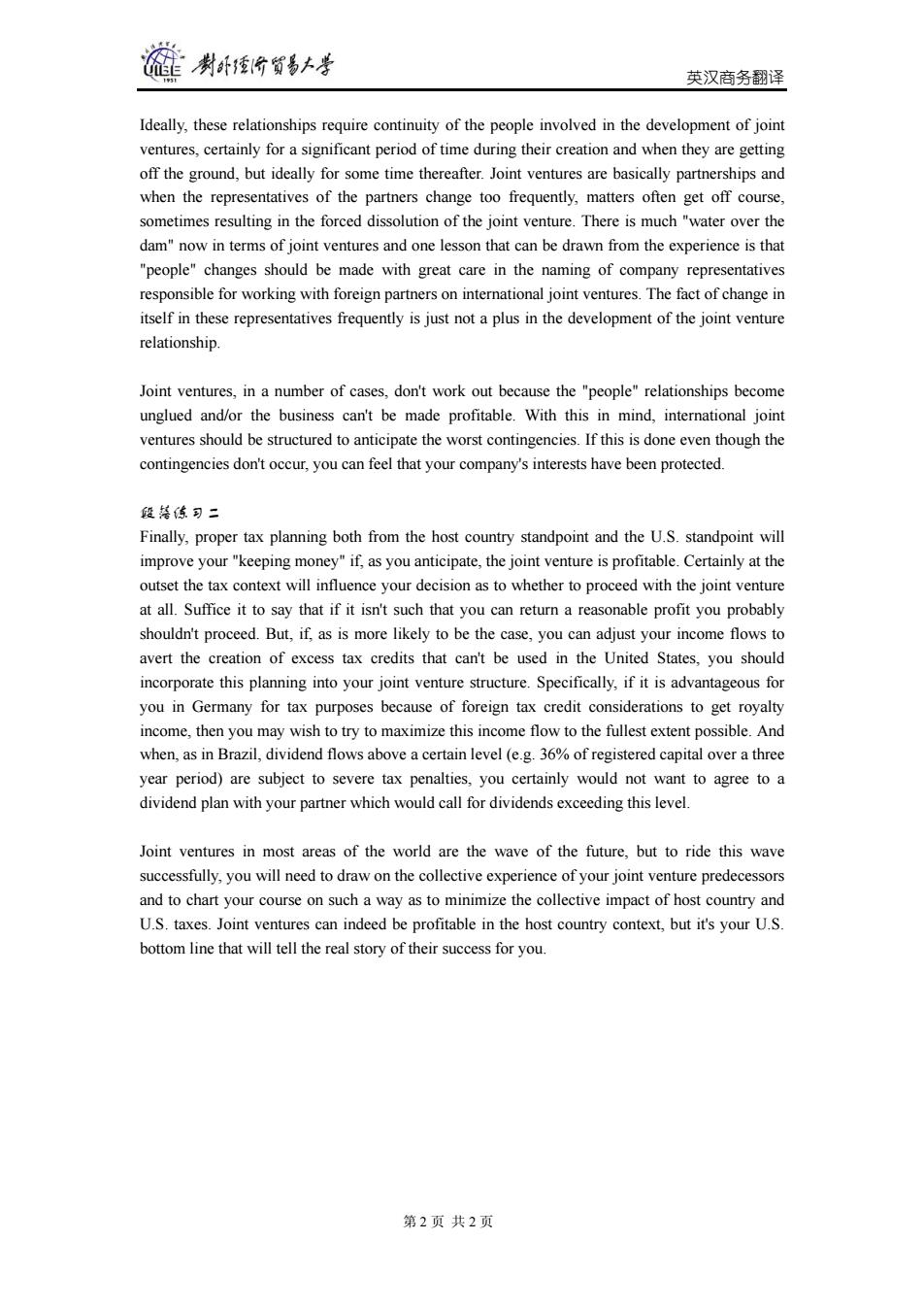正在加载图片...

制卧台贸易上兰 英汉商务翻译 Ideally,these relationships require continuity of the people involved in the development of joint ventures,certainly for a significant period of time during their creation and when they are getting off the ground,but ideally for some time thereafter.Joint ventures are basically partnerships and when the representatives of the partners change too frequently,matters often get off course, sometimes resulting in the forced dissolution of the joint venture.There is much "water over the dam"now in terms of joint ventures and one lesson that can be drawn from the experience is that "people"changes should be made with great care in the naming of company representatives responsible for working with foreign partners on international joint ventures.The fact of change in itself in these representatives frequently is just not a plus in the development of the joint venture relationship Joint ventures,in a number of cases,don't work out because the "people"relationships become unglued and/or the business can't be made profitable.With this in mind,international joint ventures should be structured to anticipate the worst contingencies.If this is done even though the contingencies don't occur,you can feel that your company's interests have been protected. 段荟练习二 Finally,proper tax planning both from the host country standpoint and the U.S.standpoint will improve your"keeping money"if,as you anticipate,the joint venture is profitable.Certainly at the outset the tax context will influence your decision as to whether to proceed with the joint venture at all.Suffice it to say that if it isn't such that you can return a reasonable profit you probably shouldn't proceed.But,if,as is more likely to be the case,you can adjust your income flows to avert the creation of excess tax credits that can't be used in the United States,you should incorporate this planning into your joint venture structure.Specifically,if it is advantageous for you in Germany for tax purposes because of foreign tax credit considerations to get royalty income.then you may wish to try to maximize this income flow to the fullest extent possible.And when,as in Brazil,dividend flows above a certain level(e.g.36%of registered capital over a three year period)are subject to severe tax penalties,you certainly would not want to agree to a dividend plan with your partner which would call for dividends exceeding this level. Joint ventures in most areas of the world are the wave of the future,but to ride this wave successfully,you will need to draw on the collective experience of your joint venture predecessors and to chart your course on such a way as to minimize the collective impact of host country and U.S.taxes.Joint ventures can indeed be profitable in the host country context,but it's your U.S. bottom line that will tell the real story of their success for you. 第2页共2页英汉商务翻译 Ideally, these relationships require continuity of the people involved in the development of joint ventures, certainly for a significant period of time during their creation and when they are getting off the ground, but ideally for some time thereafter. Joint ventures are basically partnerships and when the representatives of the partners change too frequently, matters often get off course, sometimes resulting in the forced dissolution of the joint venture. There is much "water over the dam" now in terms of joint ventures and one lesson that can be drawn from the experience is that "people" changes should be made with great care in the naming of company representatives responsible for working with foreign partners on international joint ventures. The fact of change in itself in these representatives frequently is just not a plus in the development of the joint venture relationship. Joint ventures, in a number of cases, don't work out because the "people" relationships become unglued and/or the business can't be made profitable. With this in mind, international joint ventures should be structured to anticipate the worst contingencies. If this is done even though the contingencies don't occur, you can feel that your company's interests have been protected. 段落练习二 Finally, proper tax planning both from the host country standpoint and the U.S. standpoint will improve your "keeping money" if, as you anticipate, the joint venture is profitable. Certainly at the outset the tax context will influence your decision as to whether to proceed with the joint venture at all. Suffice it to say that if it isn't such that you can return a reasonable profit you probably shouldn't proceed. But, if, as is more likely to be the case, you can adjust your income flows to avert the creation of excess tax credits that can't be used in the United States, you should incorporate this planning into your joint venture structure. Specifically, if it is advantageous for you in Germany for tax purposes because of foreign tax credit considerations to get royalty income, then you may wish to try to maximize this income flow to the fullest extent possible. And when, as in Brazil, dividend flows above a certain level (e.g. 36% of registered capital over a three year period) are subject to severe tax penalties, you certainly would not want to agree to a dividend plan with your partner which would call for dividends exceeding this level. Joint ventures in most areas of the world are the wave of the future, but to ride this wave successfully, you will need to draw on the collective experience of your joint venture predecessors and to chart your course on such a way as to minimize the collective impact of host country and U.S. taxes. Joint ventures can indeed be profitable in the host country context, but it's your U.S. bottom line that will tell the real story of their success for you. 第 2 页 共 2 页